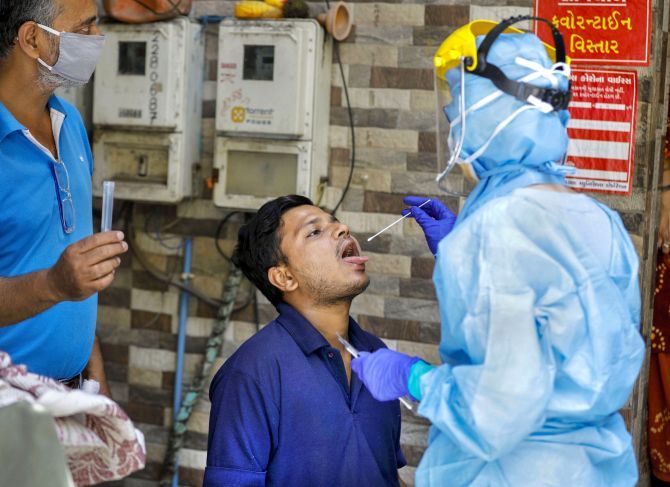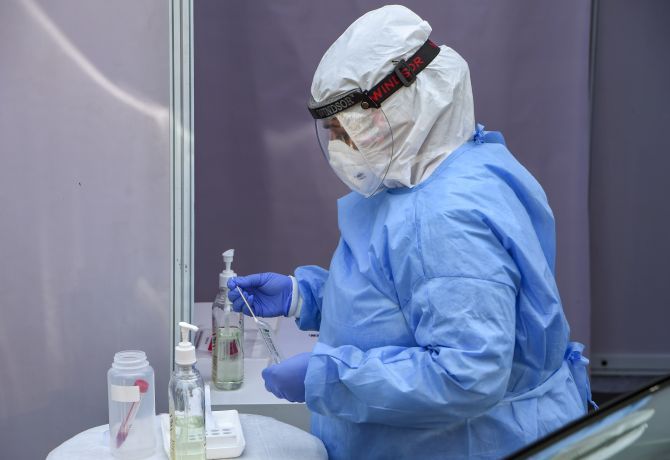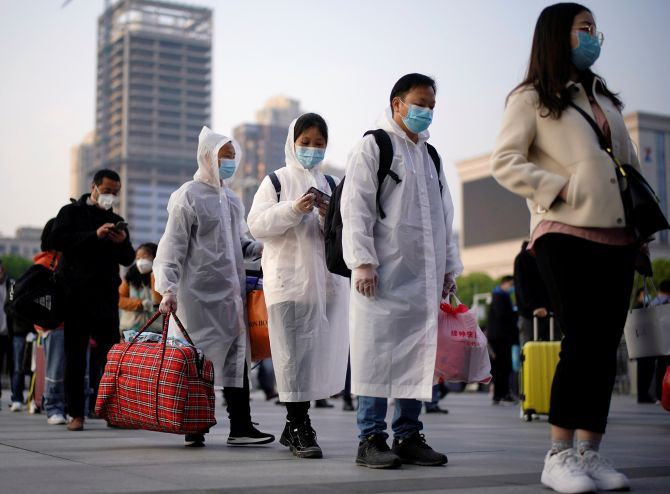'On January 17, we had our first meeting with the Cabinet secretary.'
'Different secretaries belonging to different departments attended it.'
'It was only two weeks when China had said there is a new disease.'
'So, we gave the quickest response.'

Dr Raman Gangakhedkar is the Head Scientist of Epidemiology and Communicable Diseases at the Indian Council of Medical Research.
Dr Gangakhedkar, a soft-spoken Maharashtrian, is currently the face of the Indian scientific community in the times of a pandemic that the world is yet to conquer.
His words carry credibility to a billion plus Indians confined to their homes.
Dr Gangakhedekar speaks to Senior Rediff.com Contributor Sheela Bhatt in an exclusive three-part interview.
What was the broad framework under which India formulated the strategy which is right now in implementation?
See, in January, it was mostly imported cases.
Since it was so, the issue was how do we stop them from coming in from those countries?
Because we didn't want that infection to come to us a few decisions were taken at a time when actually WHO was saying 'You should not stop international travel'.
The government took a decision saying 'we need to take proactive steps.' We stopped flights from China in January.
We also started restricting the movement of people.
And then visa issuance was reduced.
Second, we also stopped international flights from different destinations.
That broad framework was only related to imported cases. We couldn't stop Indians from coming in from abroad. Because, finally, an Indian is an Indian.
He or she would come back to his coutnry. So the decision was taken that even if we bring them in, we must do contact tracing, home isolation.
So they were kept under observation. Those who were symptomatic were offered tests. And if they were found positive, then they were admitted to hospitals.
If they were found negative they were asked to go for home isolation. Those who came from countries where it was severe situation like in Iran and Italy, they were quarantined.
They were put in army camps. And they were released only after it was found that none of them have infection.
When you look back, do you find that your strategy has worked?
Very much. See, you must remember that we used to have a huge number of international travellers.
If I recollect, close to about 67,000 to 70,000 people were coming every day. I think just before closing down, around 300,000 people were coming in daily.
Just imagine, a point prevalence of infection among them of 1% or 2%. We would have had a very severe outbreak.
When did you hear first of coronavirus? How did you react and act upon this knowledge?
Coronavirus we know for a long time.
Because SARS and MERS are coronaviruses by itself.
So we know for quite some time. Almost a decade or so. We also know that coronavirus can cause a flu-like illness.
But this one we came to know only after China told us. Novel corona was not known before.
What kind of authentic knowledge does India have of what happened in China?
We know what is in the public domain.
We know that it (coronavirus) has come from bats. We know according to them pangolins were one of the mammals that were involved when it jumped species from animals to human beings.
If I was to put it in a different way, we have some crude information about epidemiology from China.
Like?
Like, you talk of an incubation period.
It has come essentially from China. We talk of asymptomatic to symptomatic ratios, they came from China studies.
Modelling studies that happened with non-pharmacologic interventions, they came from China.
There were some learnings. Additionally, China did a lot of clinical trials, But not many of them are in the public domain.
We also know that they used certain drugs, but we are not confident because none of them are currently published.
A large number of them continue to remain in research mode as it appears. We don't have so many publication about drug trials.

After the diagnosis, what kind of drugs did Chinese dctors administer to patients?
We don't have sufficient information to say that this was an effective approach applied by China to cure patients.
We don't have authentic information.
So why are we not asking China?
Because, that we can't ask.
See in science, there is one rule, if I do a study, the moment the study is over, I would try to publish it as fast as possible.
To disseminate knowledge. Now studies must have had happened.
It is possible that -- and this is pure speculation; I don't have any evidence -- the enormity of the outbreak was so much initially they (Chinese doctors) were only involved in diagnosing treatment.
And naturally, the focus on research came at a later time.
The initial focus was to find out what has happened.
Why people are dying due to an X disease.
The daily admission rates must have been pretty high.
Naturally as a researcher, you find it very difficult to spare your time.
Because most often, a researcher is also a treating physician in most places. So essentially they must not have had been in a position to conduct research at this juncture.
If you look at their own clinical trials site, where you have to register which trial are you conducting -- the trial is given a number. Like ICMR has the CTRI (Clinical Trials Registry-India) registration -- you will find a majority of the trials actually started, at the end of the pandemic. Not in the beginning.
That is in January, in Wuhan?
Perhaps, even beyond January.
There are some that have started in April or so. That information is available.
I think they had an opportunity, but the enormity of the outbreak must have had overwhelmed them.

As a scientist, how confident are you when you are applying certain drugs to Indian patients infected by coronavirus today?
Drugs, we are not confident about.
Because we think whatever globally happening is more of speculation.
Because you don't have direct good evidence like you have for other diseases.
Like, if you use this drug you are likely to cure 'x' percentage of people. That data is not available.
Naturally, what is happening is people are using their imagination, their biological understanding of the disease, the medicines that are being used accordingly, to pick up those medicines which are in clinical trial mode.
Firstly, medicines, which are still in clinical trial stage, were used in China and then elsewhere as people started doing trials.
You note that most of the studies that are coming out, they are small number studies.
If you look at their sample size, it is pretty small. 30 or 40.
For a disease, which has infected now close to 25 lakh, your numbers of research is very low.
Why?
That is because you started late, and the whole thing overwhelms no? You quickly have too many cases to handle.
And you are not prepared to do research. Research is generally a slow kind of activity.
Rahul Gandhi (the Congress MP) alerted the nation on February 12 about coronavirus. Were you working on the issue then?
Very much. That I keep telling, no?
On January 17, we had our first meeting with the Cabinet secretary.
Different secretaries belonging to different departments attended it.
To be very honest, I don't think anybody can blame anything.
We have done our best, far earlier compared to the rest of the world.
If you look at it, it was only two weeks when China had said there is a new disease that has come and it is novel corona.
So if you look at it as a response perhaps, we gave the quickest response.

Let me ask again, as a scientist, please explain how did China cure the overwhelming number of patients in Wuhan? How did Wuhan restart normal life?
From the science point of view, I would just say they were extreme measures of lockdown using their military that worked.
But that is not about science...
But if you don't know anything, what is...
Didn't they administer a particular drug protocol?
We don't know that part.
We know they employed their army for lockdown.
People were not allowed to come out at all. So essentially what will happen is that those who are infected, they remain in their confines.
And the disease finally starts slowing down in terms of numbers.
Because your numbers cannot increase, nobody is coming in contact with infected people.
New numbers stopped coming... is that how the Chinese cured coronavirus?
We don't know, but it is possible.
Yes, they also provided what is called traditional Chinese medicine.
We have no clue what it contains.
We don't know whether it was successful. We know only one thing. The way evidence is coming up, we don't think they knew about a drug which was highly effective and that cured people.
Neither did they have vaccines that they could administer to people.
It is just non-pharmacological measures that made them come out of it.

Understood, very interesting. Why have Spain, Italy, Iran, France, Britain, America succumbed so badly to the disease?
See, one of the reasons of the current situation you must understand.
By and large, the proportion of people who travel across the globe is high in the developed countries compared to India.
So the likelihood that you could acquire this infection outside is also higher. That is number one.
Number two, the death rates continue to be higher there.
The reason is their population is far older compared to our population.
When you get old, you would have more number of people who have other diseases: Diabetes, hypertension and things like that.
So it is not something that comes as a big surprise.
More travelers bring in more infection and more vulnerable populations gets a higher number of infections.
You said you were aware of coronavirus since January and the government was working on it. How come there is a shortage of PPE and masks then?
No no, it was not just us (ICMR).
Everybody in India was aware at that time. Those who were into decision making were aware.
Now when it comes to test kits, you have to realise that initially the test kits were supplied only by Chinese manufacturers.
Because the virus was there, the virus was isolated by them.
So naturally they had more lead time to develop diagnostic kits.
They were essentially using it for their own people for diagnosis.
You must realise that you have finite capacity and you are using it within the country.
Now once that stage was gone, you would find that the rest of the world also started facing a severe outbreak.
We initially had a lesser outbreak and we had sufficient kits, but as the number increased, the kits's demand increased in lakhs.










